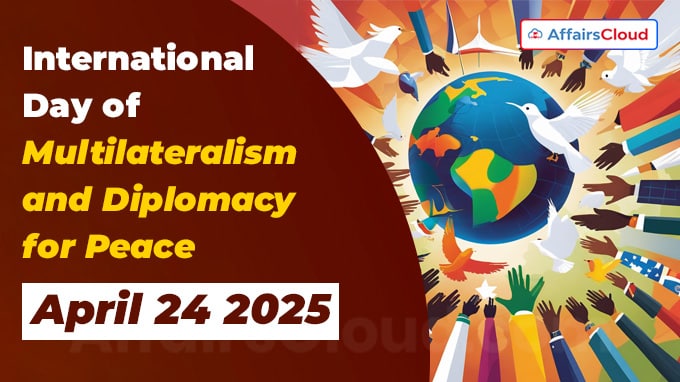 The United Nations (UN)’s International Day of Multilateralism and Diplomacy for Peace is annually observed across the globe on 24th April to reaffirm global commitment to multilateral cooperation, peaceful conflict resolution, and the principles enshrined in the UN Charter and essential for realising the 2030 Agenda for Sustainable Development Goals (SDGs).
The United Nations (UN)’s International Day of Multilateralism and Diplomacy for Peace is annually observed across the globe on 24th April to reaffirm global commitment to multilateral cooperation, peaceful conflict resolution, and the principles enshrined in the UN Charter and essential for realising the 2030 Agenda for Sustainable Development Goals (SDGs).
What is Multilateralism?
i.Multilateralism, in contrast to bilateralism and unilateralism, involves cooperation between at least three states.
ii.It is a form of international organisation rooted in consultation, inclusion, and solidarity, with collectively agreed rules that apply equally to all participants.
Background:
i.Establishment:The day was first proposed by the delegation of Azerbaijan to the UN in 2018.
- On 12 December 2018, the UN General Assembly (UNGA) adopted resolution A/RES/73/127, officially proclaiming 24th April as the International Day of Multilateralism and Diplomacy for Peace effective from 73rd session.
ii.First Observance: The Day was first observed on 24th April 2019 and has since become an annual event to foster public understanding of multilateralism.
Significance:
i.Promoting Multilateral Solutions: The day highlights the need for collective action and diplomacy to tackle global challenges like climate change, inequality, armed conflicts, economic disparity, and human rights violations.
ii.Upholding UN Pillars: It reaffirms global unity through the three core pillars of the UN: Peace and Security, Development, and Human Rights.
iii.It promotes shared responsibility and universal application, forming a system of cooperation and a pillar of global governance.
2030 Agenda for Sustainable Development:
i.Adopted in 2015 and effective from January 1, 2016, this agenda outlines 17 SDGs and 169 targets to end poverty, protect the planet, and ensure prosperity by 2030.
ii.Multilateral cooperation is key to achieving goals like quality education (Goal 4), gender equality (Goal 5), and climate action (Goal 13).
The UN Charter:
i.The UN Charter, a multilateral treaty, establishes the UN as the leading body for maintaining international peace and security.
ii.It commits member states to resolving disputes peacefully, promoting human rights, and fostering development through cooperation.
Global Commitment to Multilateralism:
i.The global community, through debates and dialogues, such as the High-level Dialogue on Renewing the Commitment to Multilateralism (2018), has consistently endorsed multilateralism as the most effective means to address global challenges.
ii.The European Union(EU), in particular, has remained a staunch advocate of the UN Charter, emphasizing its principles as the foundation of international peace and justice.




